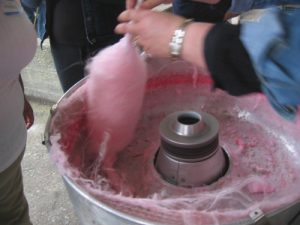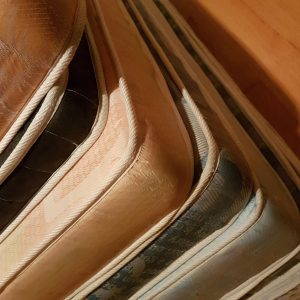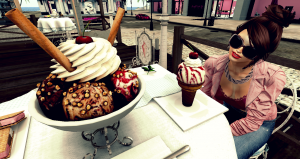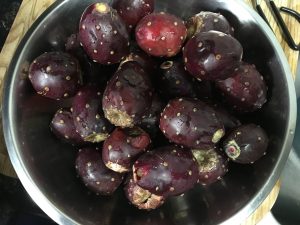Its late at night and I want something to read. Eyes scanning my library shelves, I see many familiar titles—books worthy of precious shelf space. Any voracious reader knows the high bar of shelf space. That inch is paid for with reading pleasure. My displeasure, my distaste, and you molder in the garage.

So you’d think my eyes, lighting on this title and that, would be having a hard time deciding between exquisite vistas. But they aren’t.

Rather, my tongue is sampling various distasteful elements—Yes, I remember this one, the protagonist puts her foot in it over and over. Next title—hmm, has a better protagonist, but his mother reminds me unpleasantly of things too close to home. Moving on—oh no—there lurks an insufferable fop with dialogue I can’t stand. Skip to next spine—ah this one, I love both the beginning and the end but that 15 page torture scene… Okay keep going, don’t settle. Oh, and that one’s a gem… but the sequel is unbearable—I’ll be frustrated anticipating book two the whole time I’m reading book one.

I bite my lip. My eyes scan back along the shelf. Which one is least unpalatable right now? That’s probably the one I’ll end up with.

Distaste Is My Compass—I Set Course Diametrically Away From It

Distaste is ultimately why otherwise awesome titles still sometimes get shipped to my garage. It’s also why I might not pick up the next book in the series. Perhaps I might wait for reviews on Amazon to make a purchase decision.

But the worst thing about distaste is how it stymies the likelihood I’ll hand-sell that title, series, and author to another reader. I love making recommendations—but I love it because I like making ones that guarantee delight. If there’s something in a text that gives me pause, I’ll tell my friend to buy something else instead.

Your Readers’ Distaste Is A Deadly Thing

As a writer I’m vigilant about it. Now, each time I’m in that position of weighing distaste, I take notice. When I read for pleasure, I keep a keen eye for when it wanes. I analyze my consumer behavior, particularly my re-reading habits.

Apparently many readers don’t re-read—I’m the opposite. I have an appallingly short circuit of books I frequently revisit—every 6 months to a year. I do inject new books. Let’s say I add five, if one deviates to a longer cool-down there’s usually a reason. ‘Wow, I love the other 350 pages, but that one scene has stopped me from revisiting the book for 2 years! Does distaste for that one scene really outweigh all the others I found delightful?
I do know that when I feel distaste for an element of a book I’m much more likely to re-read or purchase something from the next author down the shelf—their writing isn’t as vivid—but it also isn’t intermittently repellent.

Permanent Rejection

I Don’t Care How Good It Is For Me.
I Don’t Want It.
I have avoided returning to certain books forevermore due to one line. In others, I found nothing appealing to induce me to return—The Grapes of Wrath managed to accomplish both. It wasn’t a good fit for me as a reader. Few are the books that click with all readers—even classics don’t appeal to everyone. I’m sure The Grapes of Wrath is a pivotal book for many—in fact, I’ve read testaments praising it frequently. But I’m not going back to it, I’d much rather re-read a chewy Urban Fantasy for the 12th time instead.

I Will Continue Defiantly Consuming It
No Matter How You Chastise Me.
I’m an advocate of books not needing to be literary masterpieces. Pure escapist entertainment has more than enough value for me. But because I want to return to a novel like a good friend, over and over and over, it makes repellent things stand out all the more.

But That Brimming Brimstone Stench
Just Ruins It For Me…
The Many Faces Of Distaste

But Even They’d Find Some Intros A Slog.
Distaste can even emerge for things like pacing—the 75 page deadly dull intro slog till things get good, or the endless cliff hanger jump cut chapter endings. Be kind to me when I spend the evening with you. Don’t bore me—but please let me use the bathroom and get a fresh cup of tea every hundred pages. When I’m deciding what to read, I’m remembering the reading experience with that particular book—or with that author. The same flashback judgement call is made when I’m contemplating a new purchase.

Just Like The Prior Birds In Your Lineage…
Reader Power

Your reader’s pleasure is the deciding factor in your success. Even if you make it big—if you fail them, they will notice. They will hold it against you—and against your next publication—with their purse strings. Good taste means avoiding distaste—give me writing I can savor and I’ll read it to pieces, and buy another copy. To get free shipping from Amazon I’ll probably purchase some extras as gifts as well.

Please Tell Me There’s A Whole Series?
At This Rate I Could Chew Through 30 Books This Month Alone…
Writing Exercise 1—Taste Distaste:
Go visit the books you read for pleasure, whether this involves striding off to your home collection, the local library, or a bookstore. Sample the flavor of each in your mind like you would if you were contemplating re-reading it. Cultivate a palate sensitive to distasteful flavors—examine them, what’s rancid, what’s stale? Make notes.
What’s the burr in your sock? The rock in your shoe? The dried pea in your bedding? List authors and titles you otherwise like, detail very specifically what turns you off, look for patterns.

I find series books to be items of particular interest. In many cases, they are like children of the same parents raised in the same world—the perfect experimental specimens—why one works but another flounders can be extremely enlightening.
Brief List From A Glance At The Bookcase
- Heavy use of a Point Of View character I don’t like—or that I don’t like as much as the one from the previous book.
- Non Point of View characters that I absolutely can’t stand. Although villains often get more leeway than team hero, there’s a point where I’ll dislike them sufficiently to avoid a second encounter.
- Overly convenient plot decisions or events.
- Why are characters holding the idiot ball in a death grip? Why did you even have them pick it up?
- Failure to hit epic expectations left by prior books.
- Playing it cautious—fear of breaking the world.
- Conflict of diminishing scale.
- Weaker villains.
- World/characters gone stale—nothing really new.
- Pacing issues—is the publication schedule breaking quality?
- Author checked out—often when co-author checked in. This has befallen too many spectacular authors. Publisher pressure to write the same old thing may be a factor.

Readers judge books. They choose which books to pick up. In the process, they leave the majority of books behind on the shelf. You did it too as a reader. Often, walking away from a bookstore, I feel frustration that my haul isn’t heavier—I’m upset that my back doesn’t hurt and that ramen isn’t the week’s menu. That’s a reader kind of regret.

But I look at those emotions differently as a writer. That reader regret is an opportunity! If we can write what readers want to read, what we ourselves wanted to be laboriously lugging off to our lairs from the bookstore—then the horizon is bright.
We need to know what makes those books appeal to us that way.
Writing Exercise 2—Analyze Perfection:
Make note of any books where you don’t hit on distaste. Where is your inner princess completely satisfied with each layer of the three hundred cushy pages stacked to make her night of reading delightful?

Compare the two lists. Why did some authors choose to include the distasteful elements? Was there another way? Could that passage or character have been omitted? What did the other authors do that allowed them to sidestep putting their foot in it? Writing unrelentingly appealing literature for hundreds of pages is no happenstance. What flavors of voice, tasty characters, or devouring pace irresistibly insist you find a sumptuous bed with an excellent light source right now?

That’s a book worth writing, just as much as it’s a book worth reading.
The Value Of Doing What You Abhor

He’s my hero.
Often the most valuable things to do are those we least want to face. While occasionally we truly are blind about our failings, and the path forward is hidden, often we know what we need to do, its just agonizingly difficult.
So what are some things I’ve hidden from?
- The keelhaul of a structural edit.
- The mortification of painstakingly learning grammar rules I literally failed at learning in grade school. Tack spelling on to that. Maybe I should go unearth those lurid red-marked abuse-laden tests from 5th grade—I’ve still got them filed in the garage.
- Dialogue—oh no, I think I need to talk to humans to master that one…
- Pacing—unlearn scientific and technical writing.
- Verbosity—writing screenplays helped, but I still write like the lindworm’s coils. How bad would things have been if I hadn’t taken action?
- Characterization—again with the humans, why does it keep coming back to humans?
- Trunking a novel when I know I need to just stop picking at it like a scab and go hone my skills on another book.
Systematic Self-Challenge
But I did the things. I found grammar websites and bought grammar books (and carefully stuck the APA Style Guide on a different shelf so I didn’t get sucked back into scientific documentation). I practiced dialogue and characterization—I still have trouble eavesdropping in restaurants the way I’m supposed to… It hurt, but I trunked and resuscitated a novel. However, I didn’t exhume the old grade school tests—I’m not out to wallow in unnecessary torment, and the fact is that I’m much better at spelling now than I was then. Many of those red marked words I’ll never dredge up while writing commercial fiction anyway. Plus a pox on red ink anyway—couldn’t they use a more friendly color like emerald green or lilac or something?
Writing Exercise 3—The Objective Connoisseur:
Now re-read that list of repellent elements.

Your Taste usually matches who you are. Do you write for people like you? Do you try to write like authors you enjoy reading? In most cases both of these things are true—especially in genre fiction. Thus, your chances of running afoul of the same distasteful elements as your favorite authors is strong. Just because something matches doesn’t always mean it will taste good—it might even kill you.

The chances that your readers will react to these superficially attractive but deadly elements in the same negative way you just did in Writing Exercise 1 are also strong! Horrors.

Poisonous Ingredients
A faux pas that an established best selling author can survive may have a different outcome if included in your debut book. The good news is that you are adept at detecting these same flaws and now you are on your guard. Revisit your own writing with a vigilant eye. Refer to your list of distasteful elements from Exercise 1. Identify and flag all repellent aspects of your work—this is a search and destroy mission. Once you find the culprits—find another way.

This exercise should be done more than once with any piece of writing. Preferably after you have left it alone for a period of time so you can revisit with a clean palate.
What You Gain:
When you are done, your work will be re-read friendly to your core audience (people like you). They will also be vastly more likely to purchase new things you pen. Loyal repeat customers!
Plus, you’ll have an edge against the competition. Once your readers think of you as a solid bet as compared to most others—who they may view askance with vague dread – which book do you think they’ll select with a grin before loading up on the whole series on their way to the cash register?

All mercenary commercial interests aside—I care about what I write, distasteful elements have no place in my pieces. I want to feel good about what I’ve written—I don’t want to feel distaste blocking my hand from taking my own work down off the shelf for an evening read. There are anecdotes out there, many of them, that indicate many authors don’t enjoy reading their own work. Sometimes its a specific book that was troublesome to write—but sometimes it seems to be more universal. If it’s possible, I’d like to to enjoy reading my work—I want to analyze my works like a mad scientist, or curl and devour them as comfort fiction from time to time.
I also care about my readers—we are in a relationship of intimate reciprocity—I’m asking them to spend long hours with me in exchange for their precious discretionary income. I want those hours to be a wonder.

A Writer’s Field Of Battle
Readers could have spent that time and money on a game or movie instead. A well-written novel is immersive—it can compete in the modern Colosseum of consumer entertainment. It can wreck all comers.

“The Best Special Effects.”
Readers love a good read. I want the memory of reading my book to curve their lips at random interstitial moments in their lives. This is an achievable goal—I just have to walk the minefield of my own writing before my readers do. If I tank my indiscretions of ink proactively, no other being needs ever see my embarrassing outtakes. Like that scene where I tried to raise the tension by severing several arms, and when that wasn’t enough I cut off legs. Oh yes—that happened. But I came to my senses and returned to edit the mayhem. That scene was chopped off just like those limbs—but to much better effect.

My copy editor catching me in a comma placement gaffe is a shame I can live with. A needless, repellent stumble in story choice that makes it into print is not.
The Human Writer
It’s frightening just how many story problems I’ve excised, mended, re-written away. I’m finding more every day.

I’ve made the trip back to my bookshelf to hunt more pitfalls so many times since I started writing. Every time it helps—but I know a story is still an imperfect thing. Worse, readers are varied—a perfect tale for one will be objectionable to another—hence the advent of banned book lists.
I won’t be perfect—not as long as I write about difficult subject matters. I’ve had to make peace with that before people even figure out they should hate me. But even writing for myself—I find things I could do better, decisions I regret, places to backtrack. That is how you learn, how you unearth the hidden paths in the bracken—I think I’m a stronger writer now, and a wiser one.

Will I still make mistakes? Of course I will—I’m human, much as I’d rather be a dragon.

Dragons are tasteful creatures, they amass hoards of the best art and treasure to surround themselves with. So I endeavor to think like a scaly critic when reviewing my work. I’m getting better at excising embarrassing expostulation. Day after day, as dusk falls, I hone my skill at writing for my readers. For my true test will come—not in the bookstores, but on home library shelves.
Someday, years from now, a reader will be looking for a book to re-read late at night—that’s the hand I aim to win. Repeat seduction—when they know what they’re getting but they come back for more. That’s when you win—that’s when we all win, writers and readers both.




